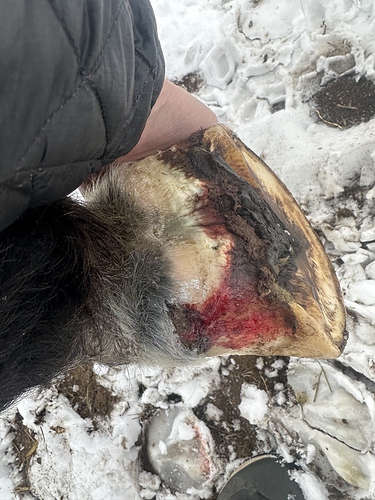Hi all! I would very much appreciate some honest insight, an M&M conference of sorts, into what might have been missed here (timeline below)? Symptom onset was so rapid and everything seemed so mild, until it wasn’t. This was my heart horse and I can’t stop going over again and again in my head that something should’ve been done differently. Thanks!!
25yo KWPN Mare (euthanized yesterday)
Generally healthy, with right forelimb issues since a career ending flexor tendon tear in 2014 and subsequent founder during turn out. Pedal osteitis in right forelimb as well. Well managed with corrective shoes and daily Equioxx for last 3 months.
Timeline:
12/4 - Presented with hoof abscess of right forelimb, began poulticing immediately and abscess had moderate drainage.
12/8 - Oozing cut noted on left hind cornet band
Vet came out: Abscess was not fully resolved, she removed the shoe and opened up abscess. Was not concerned about cornet band. Tachycardia noted and attributed to pain. Farm employees had noted mild inappetence, horse was eating when vet arrived, so this was also attributed to pain.
12/9-10 - Continued poulticing and abscess was draining well. Cornet band cut was bandaged.
12/11 - Horse was relatively sound by now and drainage stopped, appeared much more comfortable. Cornet band injury mostly healed and bandaging removed.
12/12 - Relatively comfortable.
12/13 - Cornet band began bleeding again. Photos sent to vets who recommended re bandaging but didn’t have major concerns. Evidence of possible white line disease noted on both back hooves.
12/14 - 15 - Poultice removed from abscessed hoof, hoof looked fairly normal.
12/16 AM - Lameness returned to front right, progressively became non weight bearing and thick unilateral nasal discharge noted.
12/16 PM - Vet visit: right front frog was necrotic and mostly torn off, this was not the case 12/14 evening, frog had begun to look a little funky by 12/16 morning but progressed very quickly, she was unconcerned about cornet band injury as it appeared to be healing. Tachycardia noted, along with 2 cracked teeth/dental abscesses found, sinuses fluid filled, labs showed mild kidney and liver disfunction, elevated WBC. Started antibiotics.
12/16 vet was mostly concerned that with the inability to provide NSAIDs in future (given liver / kidneys) she couldn’t be kept comfortable given the foot issues.
Spoke with my regular vet the morning of 12/17, who was less concerned with the foot, since she was more familiar with the magnitude of the issues in that leg (or lack thereof) but concerned that the blood work pointed to septicemia and that we couldn’t bring her back from the condition she was in.
We elected to euthanize yesterday (12/17 PM). By that time the horses condition had deteriorated, she was lame in both hind legs as well, tachycardic, increased resp rate, pale gums, non weight bearing in front right still, lethargic. While on Tylenol and 2 doses of antibiotics.
Never had a fever.
Given her final condition yesterday, I do think sepsis was the correct diagnosis and I do think euthanasia was the correct choice.
To provide better care in the future, I am looking for opinions on - Was the cornet band “injury” really Quittor? What was likely to have caused the sepsis? In a geriatric animal could this have been stopped?
Her teeth were last floated in September, should we have found the dental issues then?
Or do you all think that we did all we could and that some things are just not treatable? Especially with age… if everything was treatable, we’d all live forever 
I did attach a photo of the back left, the back right looked like an abscess until the frog involvement and the nasal discharge was pretty typical tooth infection discharge.




